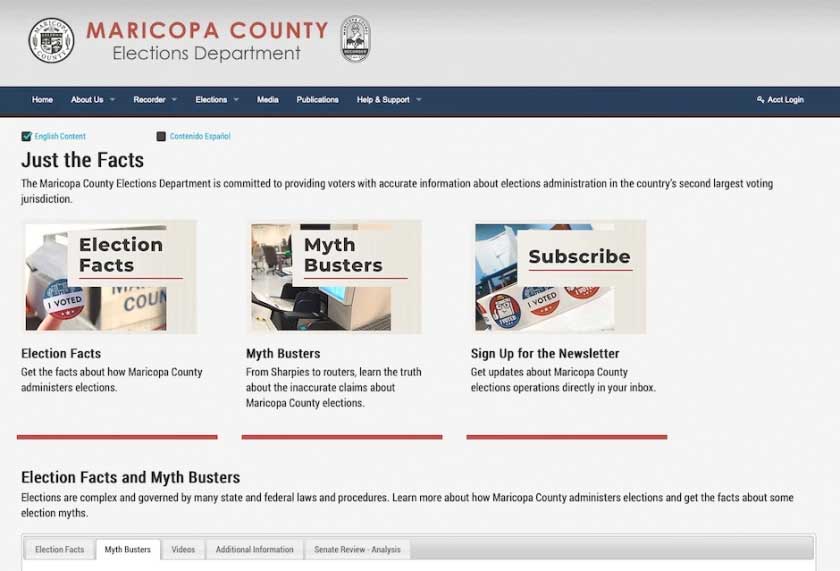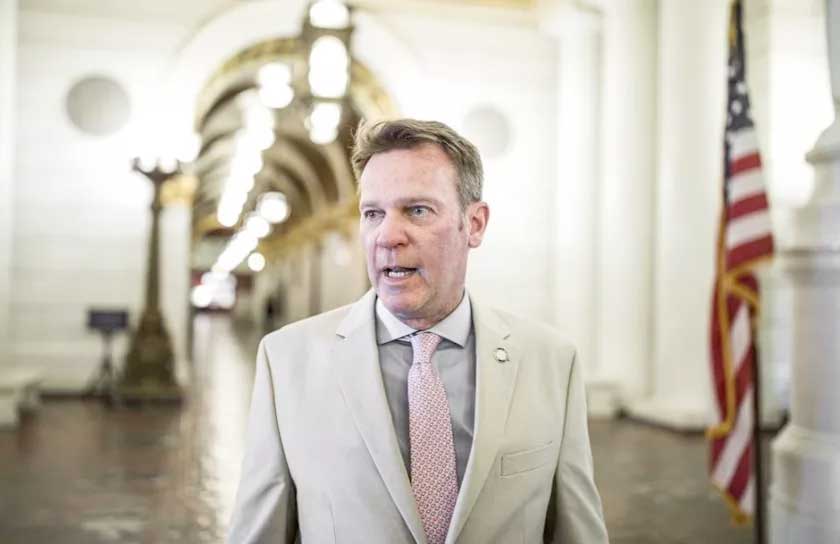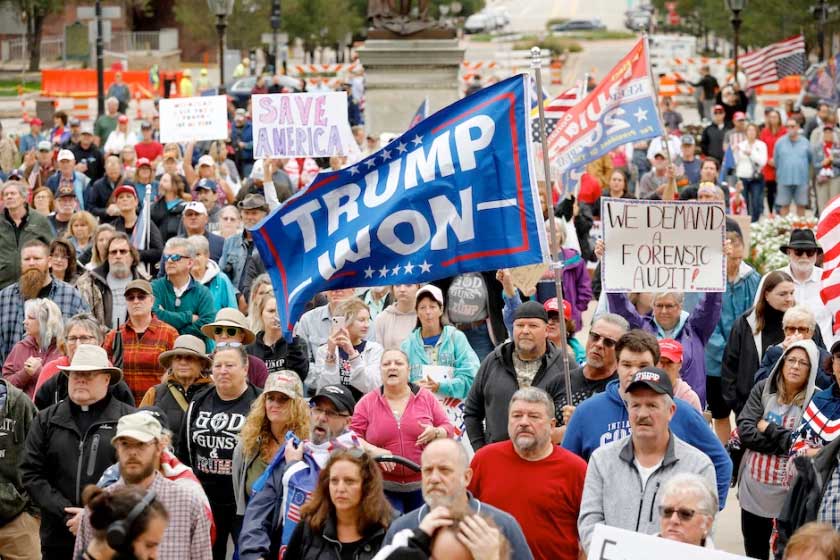Republished with permission from Governing Magazine, by Carl Smith
It’s not unusual for voters in presidential elections to be more confident about vote counts when their candidate wins. A Pew Research survey after the 2004 election found that nearly three-fourths of voters who voted for George W. Bush were “very confident” that votes were counted accurately, compared to only 18 percent of those who voted for Democrat John Kerry.
In 2016, despite a campaign in which emotion and controversy took center stage, voters from both parties had similar trust in the outcome. A year after the 2020 election, things couldn’t be more different. A November survey by the Public Religion Research Institute found 68 percent of Republicans “mostly” or “completely” agree that the election was stolen. Six percent of Democrats share these views.
The former president’s continued refusal to concede has pushed election administration, and the lives of election officials, into uncharted territory. An unconventional $6 million audit of votes cast in Arizona’s Maricopa County, largely funded by private donors, found no evidence of fraud. Along the way, it rendered $3 million in government-owned voting equipment insecure and unusable.
That hasn’t prevented a push for more such audits; most recently, a group of 187 Republican state legislators from 39 states signed a letter calling for a “forensic audit” of results in each of the 50 states and an overturning of the election if these audits find anything that would change the electoral vote count. They claim to be motivated by a “historic obligation to restore the election integrity of the vote.”
The erosion of public trust in elections is not just an election official’s worst nightmare. It’s also an unexpected and destabilizing force in a country long considered to be the world’s strongest democracy.
Election officials across the country are working hard to keep things in check. The misconduct they are being accused of never actually occurred — but that matters less than the loss of faith in a system they have sworn to uphold.
Shooting at a Ghost
It would be one thing if grievances regarding November 2020 had been allowed to fade into the past; instead, they have become tools for fundraising and campaigning. Tammy Patrick, a senior advisor to the Democracy Fund who served the Maricopa County elections department for a decade, recalls seeing legislators from well over a dozen states touring the audit mandated by the state’s Senate, making stump speeches and posing for pictures with Cyber Ninjas.
To the extent that fraud claims become integrated into runs for office or efforts to reshape voting law, they are amplified by well-funded PR and marketing that raises the noise level for local election officials. Patrick sees similarities between the current situation and 2016, when small and local offices were forced to compete against cyberattacks by sophisticated foreign adversaries.
“It’s a tremendous challenge to try to rebuild confidence in the public when the loss of that confidence is not based on statistical, provable facts,” says Ricky Hatch, clerk/auditor for Weber County, Utah and chairman of the elections subcommittee of the National Association of Counties. “It’s like trying to shoot a ghost with a bullet.”
The consistent repetition of fraud claims by elected officials, including a former chief executive, can provoke doubt even among those inclined to believe that the last election was free and fair. Election officials can find more stability in sticking to what they know about their processes than by chasing down hundreds of allegations, says Hatch. “Rather than trying to run around and refute those, we need to focus on what we do, the controls that are in place and why we feel it’s a trustworthy process.”
A video from the voter education series produced by the office of the Idaho secretary of state. Beyond its use in Idaho, the series, which includes 40 episodes in all, is intended as a resource that could be adapted for use in other states.
Setting Expectations
Voter education is the most powerful tool available to election officials, and the one that they have the most control over, says Brianna Lennon, the clerk for Boone County, Mo. “That comes in many forms.”
Written materials, posted online or printed, are a starting point, including translated, large-print and braille versions. Another best practice in this regard is ensuring that detailed, current documentation exists for every election administration process in a jurisdiction.
It’s become more common for print resources to be flanked by video, including live streaming. These can supplement live presentations, which have been problematic during the pandemic.
As COVID eases, this is changing. “We are seeing in-person speaking and educational events starting to pick back up, and they’re a great opportunity for us to connect with voters directly and demystify election processes,” says Michelle Tassinari, president of the National Association of Election Directors (NASED).
Voter disappointment is often the result of unmet expectations, says Chad Houck, chief deputy secretary of state for Idaho. If voters come into a polling place with misconceptions about what is “normal,” they are more likely to leave thinking that something was done incorrectly. The potential for this is increased when voters have previously voted in other jurisdictions, where the process may have looked different.
To avoid such misconceptions, the secretary of state’s office developed a series of 40 voter education videos that take viewers through the steps of Idaho’s election administration process and the security components along the way. The series includes an episode on election crimes such as falsely attesting to citizenship during the registration process, a felony in Idaho.
The videos are intended to be shared, used by schools, or even modified by officials in other jurisdictions for their own use, says Houck. The state worked with a production company that produced videos for the U.S. Election Assistance Committee and drew from that work for its own series.
Virginia worked with a local public broadcasting network to create public education segments about election security.
Unfortunately, these real-world experiences are competing for the attention of citizens who are learning about elections in a social media library stocked with falsehoods and confirmation bias.
Brianna Lennon is co-host of a podcast on election administration, High Turnout Wide Margins, launched during the pandemic to help election officials around the country continue their customary exchange of ideas. It’s been a common practice to invite the public to be present when voting equipment is tested or results are certified, but she and her colleagues are doing more than ever to make sure that the public knows when such events take place and that they are “emphatically invited.”
“Ninety-nine percent of the people who come through our offices for a tour leave thoroughly impressed, actually shocked, at how much attention we give to every ballot, says Hatch. “It really surprises them and they leave comforted.”
Getting more people participating in the work of elections as poll workers, election judges and observers, or helping with certification is also critical, says Lennon. “It doesn’t seem like this black box — you see how the process works, you see the people involved in making the process work and it takes the mystery away.”

The Weld County, Colo., voter information web pages include a tutorial on election disinformation. (Weld County)
Just the Facts
Carly Coppes, the clerk and recorder for Weld County, Colo., is a self-admitted “election nerd” who has spent her entire adult career in the election world. “We are a living, breathing democracy and the greatest equalizer we have as citizens is our ballot,” she says. “For anybody to be discouraged, to not participate, because of mis-, dis- or malinformation hurts my heart.”
The materials on Weld county’s voter education web pages include a tutorial on the types of false information, the actors who promulgate it, their purposes and steps that citizens can take to contain its spread. Rather than asking voters to trust her rebuttals of claims about election malfeasance, Coppes is hoping to teach them to look at inflammatory statements with a critical eye.
Similarly, Maricopa County’s “Just the Facts” campaign provides extensive rebuttals to inaccurate claims about its administration of the 2020 election. Its controversial and unconventional audit uncovered no evidence that fraud affected the election outcome, but the web resource continues to be necessary because social media posts have misrepresented the audit’s findings.

Maricopa County’s “Just the Facts” campaign provides extensive rebuttals to inaccurate claims about its administration of the 2020 election. (Maricopa County)
It’s important for election officials to take the concerns that are brought to them seriously, says Houck, but it can still be baffling to be accused of ignoring “irrefutable facts” that have been repeatedly disproved.
“One of the things that I always try to do is make sure that I’m not using triggering language, that I’m not using the language that automatically puts us on one or the other side of the aisle,” says Patrick.
Like many others in her position, Coppes doesn’t have a PIO dedicated to countering attacks on election integrity. “Everybody is consuming information in so many different ways now that it’s definitely a challenge to figure out the best way to cast our net and catch the most people.”
More investment in marketing, outreach and voter education could go a long way toward helping Coppes and her colleagues stay ahead of privately funded disinformation campaigns and allow them to focus on the elections that lie ahead. Stimulus funding helped election offices cover the added expenses of a COVID-safe election but didn’t help pay for deferred costs or future expenses. Government needs to acknowledge that elections are critical infrastructure and fund them accordingly, says Patrick.
“We have to be as aggressive as those disseminating misinformation have been aggressive,” says Hatch. “We’re not used to taking the limelight and we just, we need to be better at that.”

In July, Pa. State Senator Dan Laughlin, a Republican, spoke out against a proposed “forensic investigation” into recent elections in his state. “We have real work to do in the Capitol,” he said. (DAN GLEITER/TNS)
Everyone Has a Role
Preserving and building public trust in elections is the business of anyone who works in government, says Patrick. “Anyone who is in a public position where they have taken a sworn oath of office to the constitution and to uphold the constitution of their state needs to think about what their role is in this moment.”
At an upcoming meeting of her state’s association of counties, Lennon and a fellow clerk are making a presentation to non-election officials. “Here’s how the process works, here’s the stuff we’re up against. Let’s build a little coalition so that the other people in the building are also facing these things” she says.
Aside from openly pushing back against unfounded claims, policy makers would be wise to make sure changes to election processes aren’t being proposed in response to conspiracy theories. (Hatch has had legislators confide that they trust Utah’s processes but felt compelled by constituent pressure to introduce legislation to change them.)
Candidates who fall short can concede in a manner that does not further damage, as occurred following a failed attempt to recall California Governor Gavin Newsom. Republican challenger Larry Elder, a talk show host, had raised suspicions of fraud even before votes were counted but conceded after the election, referring to his opponent as “governor” and saying, “Come on, let’s be gracious in defeat.”
Patrick is troubled by a recent Reuters investigation that documented numerous instances in which police failed to follow up on reported threats against election officials that met federal standards for prosecution. “I’ve had dozens and dozens of calls from colleagues around the country who are tired of wearing Kevlar vests, of packages showing up on their doorsteps or their kids being followed home from school — these are not the types of activities that occur in a healthy democracy.”
Washington State Sen. Sam Hunt has acted to prevent such threats in response to what he has seen elsewhere in the country, introducing a bill that would make it a Class C felony to harass an election official. “Some of the county auditors came to us and said they would like to have that sort of protection,” he says. “We’re trying to be proactive rather than wait for something to happen.”
Two years ago, the state set aside money to enable county auditors to do more outreach. Next year, all counties will be required to provide a voter pamphlet with information on local issues and candidates as well as one for state elections. These are the most recent examples of a long-term emphasis on voter education and voting accessibility that Hunt believes may account for the fact that the electorate in his state is less agitated than those in some other parts of the country.
He can’t escape divisiveness entirely, though. Hunt is about to assume the role of chair of the Council of State Governments. He’d considered making access to voting the theme of his chairmanship but sees that as a dead end at a time when access to the ballot box has become a partisan issue.
There are other strategies that can shore up election administration. “By and large, our systems are sound and strong, but we can always make improvements,” says Hatch.
Utah may introduce random observation of election audits by a representative from the lieutenant governor’s office. Counties already formalize and document policies and procedures regarding the chain of custody of equipment and ballots, but this may become a code requirement. Although it’s forbidden for Utah elections and tabulation equipment to be connected to the internet, putting this in statute could end speculation that this might not really be in force if it’s not in the law.
Local newspapers have all but disappeared, and with them a capacity to capture the differences in election procedures from one jurisdiction to another. “This variation is why it’s so important for members of the press to engage with state and local election officials,” says NASED’s Tassinari. “Everyone has a role to play.

Protestors at an October 2021 rally demand a forsenic audit of Michigan’s 2020 election results. (JEFF KOWALSKY/AFP/TNS)
Not the Time for Egos
Patrick recalls that when she worked in Maricopa County, she and her co-workers lamented that they were toiling in obscurity, wishing more people would pay attention to election processes.
“The silver lining of the past year and a half has been that people do understand a little bit more about what it takes to conduct an election and the security measures that are in place,” she says. There’s a teachable moment, but it could lose some of its power if those who see political advantages continue to push a narrative of fraud.
Resources are a challenge for many election offices, says NASED’s Tassinari, but election officials are creative and willing to do double duty if necessary. Campaigns built on materials that can work effectively across platforms can heighten the impact of their work.
Jennifer Morrell, a former elections official who now works as a consultant to election offices, was a recent guest on Brianna Lennon’s podcast. “More than ever, we need each other,” she said.
There’s no place for egos, silos or concerns about who’s taking credit, said Morrell. “This is the time to be extending help wherever we can and accepting that help.”

Governing
Governing: The Future of States and Localities takes on the question of what state and local government looks like in a world of rapidly advancing technology. Governing is a resource for elected and appointed officials and other public leaders who are looking for smart insights and a forum to better understand and manage through this era of change.
